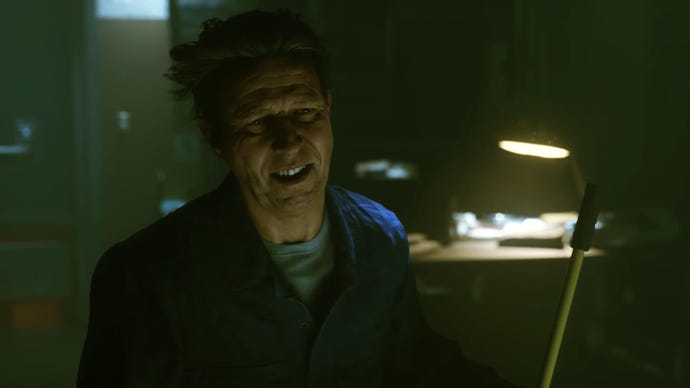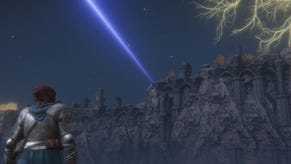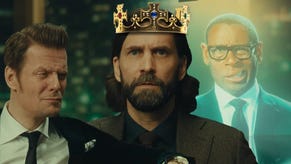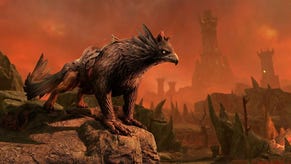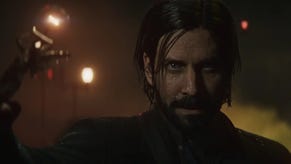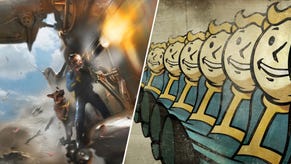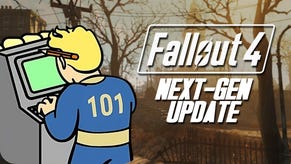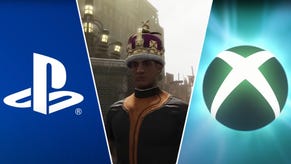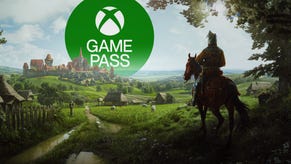Control’s fascinating lore and satisfying world building are let down by its mundane story
The fiction intended to prop up Control’s main, character-driven story is one that is infinitely more interesting than Jesse’s weird adventure.
There’s a moment towards the end of Control where you arrive at the foundation of The Oldest House – the otherworldly building where the game takes place. Amongst the many pillars holding up the entirety of the game’s world is one with something curious etched on it.
In the mostly pitch-black environment, the painting is slightly out of view. A closer look reveals that it’s a carving of the world tree, a concept in many religions/mythologies, most notably Norse. The only way to reach so deeply into The Oldest House is through Ahti’s help, the unassuming and mysterious janitor.
The game never explains Ahti’s true nature - and it never needs to - despite how crucial he is to the story’s progression. Who is he, really? Ahti occasionally mumbles some Finish words amongst his broken English. With his seemingly exceptional powers and access, is he an ancient Norse god? Are we to assume The Oldest House is itself the world tree – a place that connects all the different dimensions/realities?
As I sat there pondering about the implications of such a small detail, I realised that I am invested in the story of Ahti, his identity, and the nature of The Oldest House more than I have ever been in anything concerning game’s central protagonist, Jesse Faden. This discovery solidified what I had been feeling throughout my time with Control, that Remedy created such rich lore it made Jesse’s mundane arc all the more unappealing. In fact, Control does little to make you care about Jesse’s story.
Control's cold opening invites a lot of questions, many of which I figured would be answered along the way. Some were, naturally, but most of the revelations came by digging through the various documents and videos found in practically every room. About a third of the way through the game, Jesse reveals the real reason for seeking out the Bureau is to find her brother Dylan.
That’s it! In a game full of impossible ideas made manifest, the protagonist is simply looking for her abducted sibling. Even so, the eventual meeting with Dylan doesn’t make any big reveals, nor have a considerable enough impact on Jesse’s character progression.
All it amounts to is a new gameplay objective that conveniently shifts the attention to the B story about Trench and the origin of the Hiss. The talents of actress Courtney Hope were much better utilised as Beth in Quantum Break, enough to make her one of that game's standout characters. Here, she feels as lost as the player. Even if her performance is largely fine, she's never challenged through interesting emotional moments.
The more I rummaged through the game’s collectables and discovered its hidden areas, the more I was saddened to see the potential of Control’s exquisitely-crafted world squandered.
Over the course of the game, you’ll come across reports chronicling the many adventures into the unknown in the Bureau’s past; details about field missions to retrieve Objects of Power and contain the resulting Altered World Events (AWEs) - none of which you get to experience first-hand. Several of them, in fact, are dedicated to the AWE that kicked off Jesse’s story in the first place, but all of it is bound to pages of collectables.
Even if there was never any intention for Control to take place during the Bureau’s heady years, the main story could have done more to explore that side of Bureau. Trench, Darling, and the events that lead to the arrival of the Hiss are just too intriguing to be limited to window dressing. When the game ceases meandering and finally loops back around to address some of these questions, it does it so hurriedly as if it’s running out of time, and ends on a weak ‘good guys win, evil banished’ note.
There exists a different Control where you’re a field agent like those who first arrived at Ordinary, or one of the pioneers who ventured through the Thresholds into other worlds. I could even image a more engaging game where you have to actually play the role of director, making budget calls and reading mail as you're slowly corrupted by an otherworldly force. You know, the game Trench was the star of.
Mapping the unknown, altering reality and defining cosmic entities are all things that took place in Control’s world at some point, I just wish we didn’t arrive so late to the party.
